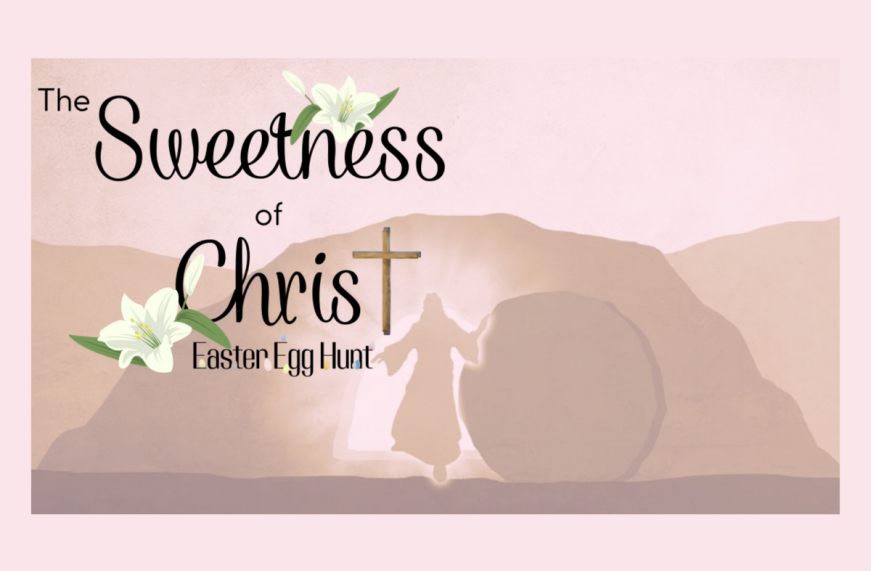The Sweetness of Christ Easter Egg Hunt

This Easter egg hunt invites kids to savor the mouthwatering yumminess of Easter candy while providing an entertaining reminder about the enduring sweetness of Christ’s sacrifice for us.
The Candy
Below is a list of Easter egg candy that we’ve matched with a related Bible verse that exemplifies the depth of Christ’s sacrifice, and a short description as to how the candy and verses are connected.
Fudge
Verse: Romans 8:11-And if the Spirit of him who raised Jesus from the dead is living in you, he who raised Christ from the dead will also give life to your mortal bodies because of his Spirit who lives in you.
Connection: With its rich and indulgent flavor, fudge is like the spiritual nourishment and vitality that we receive through the Holy Spirit, made possible by Jesus’ resurrection.
Toffee
Verse: 1 Corinthians 15:58-Therefore, my dear brothers and sisters, stand firm. Let nothing move you. Always give yourselves fully to the work of the Lord, because you know that your labor in the Lord is not in vain.
Connection: Similar to how toffee requires firmness to withstand pressure, we are encouraged to stand firm in faith and serve the Lord.
Candy Necklace
Verse: Ephesians 2:8-9-For it is by grace you have been saved, through faith—and this is not from yourselves, it is the gift of God—not by works, so that no one can boast.
Connection: Just as the colorful candy beads are connected to form a necklace, we are connected by God's grace through faith in Jesus’ resurrection and not by our own works or merit.
Butterscotch
Verse: 1 Peter 1:3-4-Praise be to the God and Father of our Lord Jesus Christ! In his great mercy he has given us new birth into a living hope through the resurrection of Jesus Christ from the dead, and into an inheritance that can never perish, spoil or fade. This inheritance is kept in heaven for you.
Connection: The warm, rich, comforting flavor of butterscotch symbolizes the comfort and assurance of living hope and eternal inheritance.
Fruit Snacks
Verse: Galatians 5:22-23-But the fruit of the Spirit is love, joy, peace, forbearance, kindness, goodness, faithfulness, gentleness and self-control. Against such things there is no law.
Connection: Fruit snacks' assortment of flavors and colors are like the fruits of the Spirit that we receive through Jesus’ resurrection.
Chocolate Bunnies
Verse: 1 Corinthians 15:22-For as in Adam all die, so in Christ all will be made alive.
Connection: Bunnies have a lot of babies, which symbolizes new life. In the same way, chocolate bunnies are a reminder of the eternal life offered through Jesus' death and resurrection.
Chocolate Lambs
Verse: John 1:29-The next day John saw Jesus coming toward him and said, “Look, the Lamb of God, who takes away the sin of the world!”
Connection: Chocolate lambs represent Jesus as the sacrificial Lamb of God.
Saltwater Taffy
Verse: Colossians 3:1-Since, then, you have been raised with Christ, set your hearts on things above, where Christ is, seated at the right hand of God.
Connection: The chewy and stretchy consistency of saltwater taffy symbolizes how we can be pulled and shaped to do good when we follow Jesus’ example.
Candy Crosses
Verse: Colossians 2:15-And having disarmed the powers and authorities, he made a public spectacle of them, triumphing over them by the cross.
Connection: At first, the cross stood as a symbol of shame and defeat. But Jesus’ resurrection turned it into a symbol of triumph and redemption.
Chocolate Truffles
Verse: 1 Corinthians 15:20-21-But Christ has indeed been raised from the dead, the firstfruits of those who have fallen asleep. For since death came through a man, the resurrection of the dead comes also through a man.
Connection: Chocolate truffles represent the richness of life that we receive through Jesus’ resurrection. Just as the first fruits represent the beginning of a harvest, His resurrection is the first of many to come, promising eternal life to all who believe.
Sweet and Sour Candy
Verse: 1 Peter 1:8-9-Though you have not seen him, you love him; and even though you do not see him now, you believe in him and are filled with an inexpressible and glorious joy, for you are receiving the end result of your faith, the salvation of your souls.
Connection: The combination of sweet and sour flavors reminds us of the value in remaining faithful. Just as the first taste of sourness gives away to sweetness, the challenges we face in life ultimately turn to everlasting joy.
Jelly Beans
Verse: John 3:16-For God so loved the world that he gave his one and only Son, that whoever believes in him shall not perish but have eternal life.
Connection: The variety of colors and flavors in jelly beans are like God’s all-encompassing love for all people and forgiveness for all sins.
Cotton Candy
Verse: Psalm 30:5-For his anger lasts only a moment, but his favor lasts a lifetime; weeping may stay for the night, but rejoicing comes in the morning.
Connection: The fluffy light texture of cotton candy is like the cheerfulness and joy that happens the morning of Jesus’ resurrection. The transition from weeping to rejoicing in the verse helps us remember to find hope and joy in Jesus’ gift, after the sorrow of His crucifixion.
Chocolate Easter Eggs
Verse: Matthew 28:6-He is not here; he has risen, just as he said. Come and see the place where he lay.
Connection: The hollowness of the egg is like the tomb that had been found empty.
Hard Candies
Verse: Luke 24:6-7-He is not here; he has risen! Remember how he told you, while he was still with you in Galilee: ‘The Son of Man must be delivered over to the hands of sinners, be crucified and on the third day be raised again.’
Connection: Hard candy, with its durability and long-lasting sweetness, conveys the enduring truth of Jesus' resurrection.
Easter Candy Corn
Verse: 1 Peter 2:24-He himself bore our sins in his body on the cross, so that we might die to sins and live for righteousness; “by his wounds you have been healed.”
Connection: The three layers of color are like the process of transformation and renewal through Christ's atonement, moving from darkness to light, sin to salvation.
Black Licorice
Verse: Acts 2:24-But God raised him from the dead, freeing him from the agony of death, because it was impossible for death to keep its hold on him.
Connection: Licorice, with its dark color and strong flavor, symbolizes the darkness and agony of death that Jesus experienced. Yet, despite its strong taste, black licorice can be an enjoyable treat. Likewise, Christ’s death brings hope for the wonderful life that comes after death.
Easter Egg Marshmallow Candy
Verse: Romans 5:8-But God demonstrates his own love for us in this: While we were still sinners, Christ died for us.
Connection: The marshmallow middle of Easter egg marshmallow candies is like the sin of humanity and separation from God. Even though we all have sinned, God chose to show us love by sending Jesus to die for our sins. The chocolate coating is a reminder of the protective covering of Christ's sacrifice, which surrounds us.
Candy Canes
Verse: 1 Corinthians 15:57-But thanks be to God! He gives us the victory through our Lord Jesus Christ.
Connection: The candy canes shape resembles the letter "J" for Jesus, and the colors red and white are like his blood and purity. Together, they represent Jesus’ victory over sin and death.
Rock Candy
Verse: Matthew 27:51-At that moment the curtain of the temple was torn in two from top to bottom. The earth shook, the rocks split.
Connection: Recalling the extraordinary events surrounding Christ's crucifixion and resurrection, Rock candy, is like the splitting of rocks at the moment of Jesus' death.
Easter M&M's
Verse: Mark 16:6-“Don’t be alarmed,” he said. “You are looking for Jesus the Nazarene, who was crucified. He has risen! He is not here. See the place where they laid him.”
Connection: The bright and colorful candy-coated shells symbolize the bright and joyous feelings accompanying the celebration of Jesus' resurrection.
Setting Up the Hunt
For this Easter egg hunt, you’ll fill plastic eggs with the aforementioned candies and the matching Bible verses. Hide the eggs, and have the kids search for them. After all of the eggs have been found, gather the kids into a group and introduce the connectedness between the sweetness of Easter candy and the sweetness that comes from Christ’s sacrifice. Feel free to use this as the introduction or come up with one of your own:
Jesus' sacrifice is like the sweetest candy imaginable, because it shows just how much He cares about each and every one of us. He knew that we all make mistakes and sometimes do things that aren't right. But instead of getting mad at us, he chose to help us in the biggest way possible. He loves us so much that he wanted to make sure that we could always feel loved and forgiven. So He allowed Himself to take the punishments for all of the bad things all of us have done. Because of what he did, we can have hope and know that we're never alone, no matter what happens. So, even though Easter egg candy is tasty, Jesus’ gift is the sweetest thing ever and gives us lasting strength and keeps us going forever.
Next, have the kids take turns opening their eggs and read the correlating Bible verse. After the verse has been read, share with the kids the connection between the verse and the candy. Encourage an active discussion with the kids about the meaning of Easter by asking questions and having them share personal insights.
We hope you enjoy this fun, engaging, and Christ-centered spin throughout your Easter celebrations!
-Torrance Church of Christ






